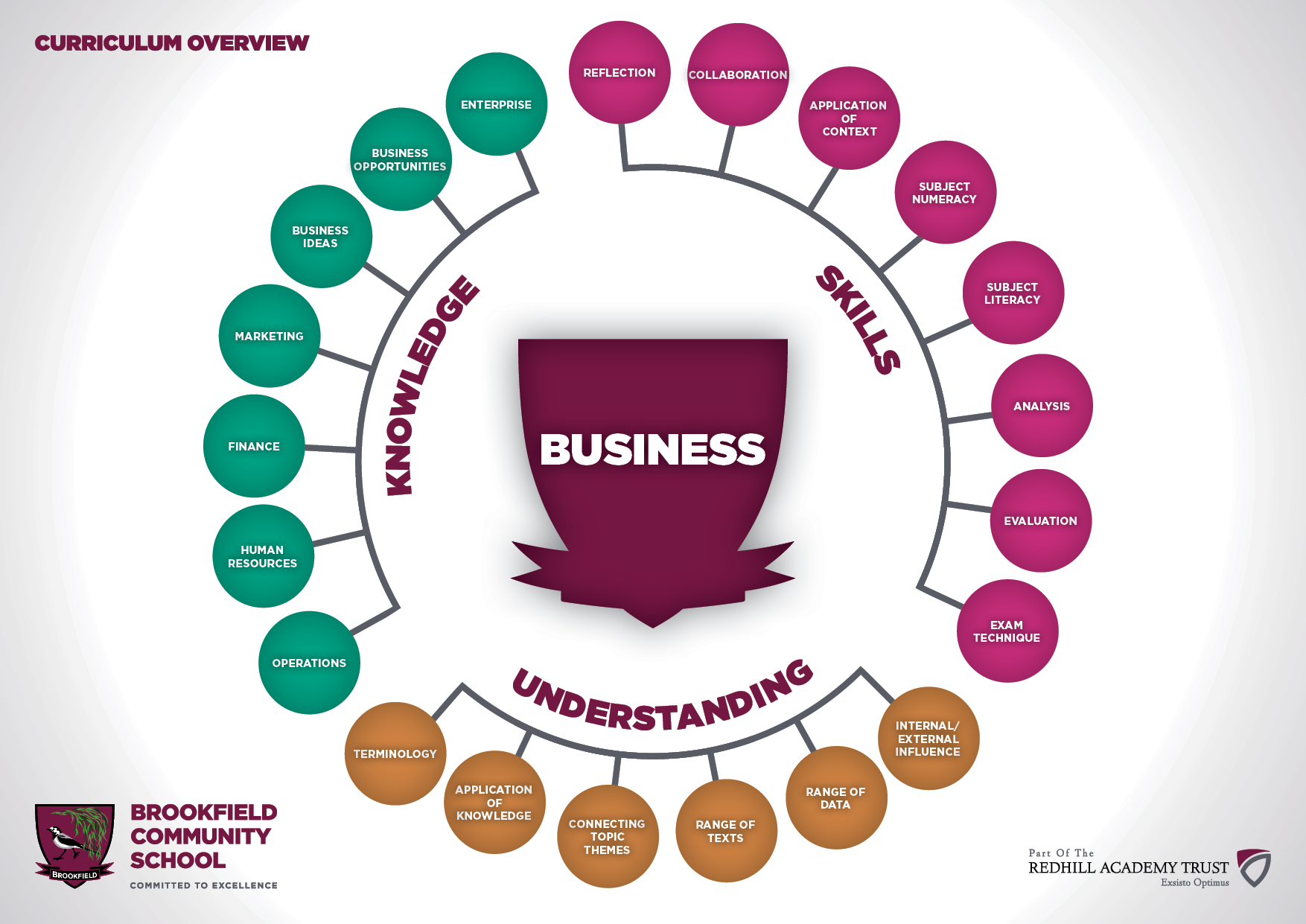Business Studies
Click image to view full size.
Introduction to Business & Economics
You might have an interest in business, and want to start your own business one day. You may have an enquiring mind and be interested in learning about the world around you, how businesses are set up, and what it is that makes someone a great entrepreneur.
GCSE Business Studies develops students understanding of the work of business. During the course students develop a variety of skills including:
- Making decisions and developing persuasive arguments
- Creative and practical problem solving
- Understanding data, finance and communication.
GCSE Business Studies is also a great step preparing you for further and higher education such as A Levels and BTEC courses. A GCSE Business course could help prepare you for an entrepreneurial role and helps you to gain an understanding of what is involved in a business-related profession, such as accountancy, law, marketing or the leisure and tourism industry.
Key Stage 4
GCSE Business
Exam Board: Edexcel
The Course
The course is structured into two themes, taking students from how entrepreneurs set up and run new businesses (Theme 1) through to how to grow a global businesses (Theme 2).
Theme 1 concentrates on the key business ideas, issues and skills involved in starting and running a small business. How and why do business ideas come about? What makes a successful business? Students learn how to develop an idea, spot an opportunity and turn it into a successful business. They also gain a greater understanding of how to make a business effective, manage money and see how the world around us affects small businesses and all the people involved.
Theme 2 examines how a business develops beyond the start-up phase. It focuses on growing the business, with an emphasis on marketing, production, finance and human resources. It also considers the impact of the wider world on the decisions a business makes as it grows such as the legal, social, technological and environmental factors.
How are students assessed?
There are two exam papers, focusing on each theme. The exam questions are based largely on case studies of real businesses.
Key Stage 5
A Level Business
Qualification: Pearson Edexcel Level 3 Advanced GCE in Business (9BS0)
Exam Board: Edexcel
The Course
(Knowledge, Understanding and Skills)
This course is an Edexcel Level 3 Business A level, allowing students to develop enthusiasm for business studies, gaining a holistic understanding of businesses in context, developing a critical understanding of organisations and their ability to meet society’s needs and wants, allows students to understand that business behaviour can be studied from a range of perspectives, generate enterprising and creative approaches to business opportunities problems and issues, be aware of the ethical dilemmas and responsibilities faced by organisations and individuals, acquire a range of relevant business and generic skills including decision-making, problem-solving, the challenging of assumptions and critical analysis and finally applying numerical skills in a range of a business context.
How are students assessed?
Candidates will take 3 examinations each of 2 hours. They are titled:
1. Marketing, people and global businesses
2. Business activities, decisions and strategy
3. Investigating business in a competitive environment
Enrichment
Young enterprise which allows the opportunity to provide young people with the opportunity to develop and apply an enterprising mindset needed to earn and look after their money and make a positive contribution to their community.- See Mrs New.
Progression Opportunities
Graduates in Business and Economics related disciplines often end up being some of the most highly paid graduates. Jobs in banking, finance, consultancy, accountancy, business management etc. are highly remunerated and offer great opportunities for career progression. For people with the right skills and abilities, there are great opportunities to develop a rewarding and lucrative career.
A Level Economics
Qualification: Economics (7135, 7136)
Exam Board: AQA
The Course
(Knowledge, Understanding and Skills)
This course is an AQA Economics A level. The course will develop an interest in and enthusiasm for economics, and appreciate the contribution of economics to the understanding of the wider economic and social environment. Students will develop an understanding of a range of concepts and an ability to use those concepts in a variety of different contexts. Also, use an enquiring, critical and thoughtful approach to the study of economics and develop an ability to think as an economist. Finally, students develop analytical and quantitative skills, together with qualities and attitudes which will equip them for the challenges, opportunities and responsibilities of adult and working life.
How are students assessed?
Candidates will take 3 examinations each of 2 hours. They are titled:
1. The operation of markets and market failure
2. The national economy in a global context
3. Economic principles and issues
Enrichment
Visits to local business, so students can observe first hand how theoretical economic concepts are applied to real world businesses. Talks from external businesses allow professionals from the business world to share their experiences and insights, which provides students with networking opportunities and allows them to understand the dynamic nature of the economy. As well as revision conferences which allow critical thinking skills in the real world, preparing for the field of economics.
Progression Opportunities
An A-level in Economics will benefit you if you are looking to go on to study economics, business or finance at university. The skills you acquire will help you no matter what degree you choose.
You may choose to pursue a career in a directly related field such as banking or finance. The A-level course in Economics will stand you in good stead by giving you an insight and understanding of the economic forces that impact your day-to-day activities. Alternatively, you may decide to follow a career path which isn’t directly related to your course of study. The analytical and evaluation skills that you will have developed will be useful whatever path you choose in the future.


